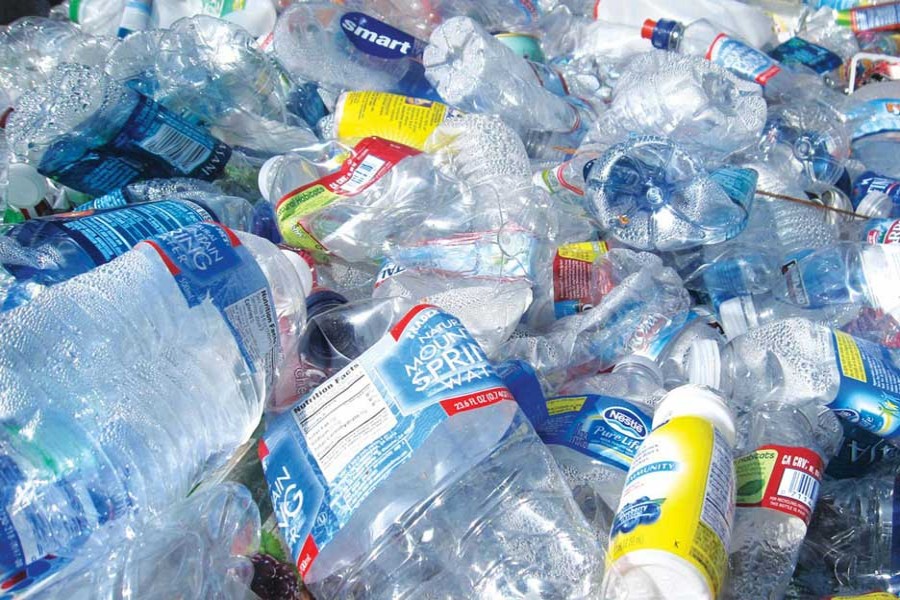
Published :
Updated :

The news item on densely plastic polluted Karnaphuli riverbed is really a strong warning as it shows a threat to environment of the country. The riverbed of Karnaphuli is covered by polythene and plastic materials and dredging is hampered due to plastic and polythine waste layers. The research conducted by BUET (Bangladesh University of Engineering and Technology) revealed that Karnaphuly's riverbed from 2 to 7 metres is covered by polythene and plastic materials.
The 'Sadarghat to Bakaliar Char Dredging' project, which started in 2018, is now hampered because the dredging machine could not work on riverbed as plastic materials clogged up the head of cutter suction of the dredger.
Bangladesh is a country of rivers and rivers contributed immensely to the economy and people's livelihoods. Karnaphuli river is the lifeline of economic activities, thanks to heavy urbanisation and industrialisation in the past 30 years. It is the major seaport of the country, which is located on the right bank of Karnaphuli river. The whole country is dependent on this port, Chattogram port. But Karnaphuly river is the worst victim of uncontrolled pollution and lack of proper waste management which actually posing a serious threat for the country and environment.
The Karnaphuli river is linked by 37 canals which dump wastes including polythene materials. The Chattogram city does not have proper sewage treatment plant. The city has approximately 6.0 million people who produce 2500 tonnes of waste and dumped in open landfills. All household wastes, unhygienic sewage water and those 2500 tonnes of wastes are thrown to the Karnaphuli river. Besides, uncertified vessels release spilled oil which is also causing immense pollution to the river. This has been a major concern for the nation.
Concerns over plastic pollution are growing as plastic causes immense biodegradable pollution especially for marine life. Now we could see how the rivers are rapidly dying due to use of plastic, especially single use plastic bags. It's time to ban single use plastic. Otherwise, our life will be more endangered.
On January 6, 2020, the High Court ordered the government to ban single-use plastic products in coastal areas, hotels, motels and restaurants across the country within a year as these are hazardous for human health and environment. The court also ordered the government to strictly enforce the ban on polythene or throwaway plastic bags across the country through regular market monitoring and closure of polythene manufacturing factories.
To curb the use of plastic, the government should strictly ban polythene. Single use plastic materials production must be banned so that none can use it. All grocery, restaurant, roadside restaurant and beverage shop should be monitored so that none of them can sell or buy single use plastic materials.
All national and multinational companies, especially international beverage companies have to take initiative to stop production of drinks and bottles, which are using single use plastic. Multinational beverage companies can reduce plastic use significantly by using alternatives to plastic bottles and the government has to take initiative so that they don't pack their products in single use plastic materials.
To save the river Karnaphuli as well as all other rivers in the country from pollution, it is necessary to ban plastic immediately.All canals that are connected to the rivers and work as source of dumping plastic and wastes, must be cleaned regularly. City corporations must take initiative for waste management properly. On top of that, a strong awareness-raising campaign should be carried out. Through schools and colleges, we need to teach and raise awareness about harmful effects of plastic pollution and hazards so that children and adults are all aware and make good habit of avoiding use of single use plastic. Moreover encroaching on river banks or free land of rivers must be stopped and strong legal action should be taken against any kind of encroachment.
We can follow the example of India which has banned such use of plastic materials. We need to remember that the Karnaphuli river is contributing to exports and imports of Bangladesh and the source of livelihoods of many,, many people. Our readymade garment sector is heavily dependent on the Chattogram port as all products are exported and raw materials imported through this port. If the riverbed is covered, ships will face increasing difficulties in entering the port area and thus the country's export and import trade would be hampered. All other rivers of the country should be taken care of and saved from the disaster of polythene pollution so that we can save our marine life and save ourselves from serious health and economic hazards.
Rahima Aktar is an expatriate Bangladeshi, working in a German Fashion Brand, in Germany.


 For all latest news, follow The Financial Express Google News channel.
For all latest news, follow The Financial Express Google News channel.